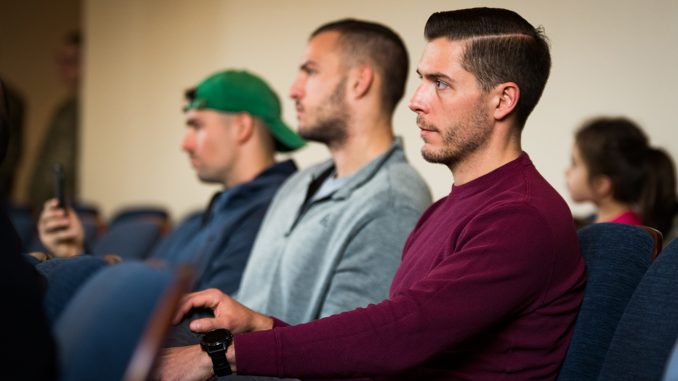
When Bergen Brown was planning to discharge from the United States Navy, a senior chief at Naval Station Norfolk in Norfolk, Virginia encouraged Brown to look at Temple University
Brown, a junior accounting major who is 26, came to Temple in Fall 2018.
“A lot of times you feel like you’re a little bit behind a lot more than the average student,” he said. “And that goes for most students who are a little bit older. It’s hard to try to connect with others.”
Some students who are veterans can feel a sense of isolation, according to Military.com, which provides information about benefits to military members, veterans and families.
Bob Hartnett, a junior public relations major and a U.S. Marine Corps veteran, said he doesn’t see having trouble relating to his peers as a negative thing, but just a challenge.
“It’s different because you’re a lot more mature especially being in the military, but that’s the type of thing that helped me to be able to focus,” Hartnett said. “It helped me with structure, to be able to sit down and plan things out and to get them done.”
Although Brown himself has not experienced this, he said professors should be aware that classroom discussions can trigger some veterans, an experience he has heard among his peers.
“There’s certain veterans who have PTSD or things like that, and sometimes professors overlook these types of things,” Brown added.
Veterans’ experiences in the military can lead to PTSD, and the number of veterans with PTSD varies depending on when they served, according to the U.S. Department of Veterans Affairs.
There are 972 recipients of the post-9/11 GI Bill at Temple, not including any active duty military personnel, according to College Factual. The bill offers higher education and training benefits to veterans, service members and their families who served after Sept. 10, 2001.
Adam Trapanotto, a senior exercise and sport science major and a U.S. Navy veteran, said students who are veterans struggle to find their identity when transitioning to civilian life.
“You’re used to a regimented style of living, and then all of a sudden now you have the freedom to do whatever you want,” he said. “And then on top of which you lose that commonality with a lot of people you connect with. You’re struggling for the sense of identity.”
It is important for veteran students to advocate for themselves and seek out all resources like disability benefits to help them, Trapanotto said.
“That was one big thing that I struggled with when I first initially transitioned out of the military,” he added. “I don’t want that stigma I’m doing this to transition out.”
Craig Turner, a senior economics major who joined the U.S. Marines during the Afghanistan and Iraq wars, said he had to adjust to civilian life after living with a “tribal mentality.”
“In the military, everything you do is for the guy to your left to your right,” Turner said. “So adjusting that was definitely different. And then once you overcome that, it’s pretty easy as long as you don’t isolate yourself, which I know a lot of veterans do.”
Brown said although he is a part of many student organizations, he connects better with students who are veterans. He works at Temple’s Military and Veteran Services Center, where he has found a “brotherhood.” The center is a centralized resource for prospective and enrolled military-affiliated students.
Prior to creating the center in 2010, Laura Reddick worked in Temple’s Office of Undergraduate Admissions for 21 years where she often worked with military-connected students.
“One of the things I realized was once they were here at the university, they were on their own,” she said. “I try to treat them like family when they come in here.”
Reddick created programs for students, like the Veterans Day Ceremony held on Monday at Rock Hall Auditorium, the annual Military Appreciation 1 Mile Walk/5K Run/Rucksack Relay on Wednesday.
“Our office is designed to help students transition from military life to college life,” Reddick said.
“We want students to know they have a safe space to come to and get information,” she added.
Turner hopes that non-military-connected students and students who veterans would interact more.
“There can’t be a divide,” he said. “It’s really important to have a conversation between the two so they can understand each other so it doesn’t remain, ‘Oh. That guy with the tattoos that sits in the back of the room, that’s a veteran, I shouldn’t talk to him.’ It’s like, ‘No.’ Go open up your mouth and say hello.”


Be the first to comment